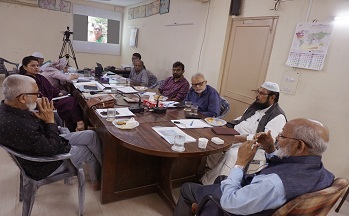The IOS Centre for Historical and Civilisational Studies (IOSCHCS) organises a Discussion on Framing the themes of research projects related to the social and cultural life of medieval India and identifying scholars to take up the themes

The IOS Centre for Historical and Civilisational Studies (IOSCHCS) organises a Discussion on Framing the themes of research projects related to the social and cultural life of medieval India and identifying scholars to take up the themes
A discussion on framing the themes of research projects related to the social and cultural life of medieval India and identifying scholars to take up the themes was held in a hybrid mode at the Institute of Objective Studies, New Delhi by the IOS Centre for Historical and Civilisational Studies on November 8, 2022.
The programme started with the recitation of a verse from the Holy Quran by Maulana Abdul Hamid Nomani.
• Prof. Syed Jamaluddin presented a brief introduction of the IOS Centre for Historical and Civilisational Studies (IOSCHCS). He informed the attendees that the main focus of the current meeting would be on the social-cultural history of medieval India. He also said that there is a need for the development of a comprehensive textbook to cover the subject matters that are being scrapped in NCERT textbooks. He also proposed to include the study of folklore—customs, traditions, artforms, etc. —of certain communities, such as Mappila community, Meos (Mewati) community, Urdu Muslims (Urdu-speaking) and Tamil Muslims. Dr Babli Parveen added one more community to the list, that is, Bhil community. Maulana Nomani suggested Kathat and Dhurrat communities from Gujarat.
• Dr. Babli Parveen said that before taking up the themes, we have to be assured that these themes are not overdone. If we are to work on the topics already covered, we have to make sure that we bring a new perspective to it, at least.
• Maulana Abdul Hamid Nomani said that the centre may focus on working on the Mappila community, acknowledging its relevance in the current time. He also suggested that considering the prevalent practice of the distortion of history by the Hindutva forces, we could bring the focus on the history of Salar Masud and Raja Suheldev, which has been twisted by the ruling party to suit its propaganda.
• It was decided that a textbook would be brought into different volumes, keeping in mind the existing as well as discontinued NCERT books. The literature will largely cover social-cultural history, which will cater to undergraduate students, researchers, and civil services aspirants. The objective would be to highlight the spirit of syncretism, integration, and inclusion showcased by Muslims throughout history. Dr. Iqbal Ahmad said that each volume should be divided into different themes. Prof. Syed Jamaluddin said that he would look after dividing the textbook into themes along with the help of Prof. M. Ishaque, Prof. Wasim Raja and Dr. Babli Parveen. It was also decided that Dr. Iqbal Ahmad and Dr. Jawaid Alam will look after the theme of the national movement of India.
• Prof. M. Ishaque said that we have to bring a radical response to the existing cultural biases. He also suggested that the theme of the literature should mainly focus on the current political developments in India.
• Dr. Mallika Begum said that she will be working on “A Study on the History and Settlements of Tamil Muslims in Tamil Nadu”. She said that historical writings ignore the role of the Tamil Muslims, which should be brought forth to highlight the role of Muslims in the national freedom struggle. Prof. Syed Jamaluddin requested her to send the abstract to the office for consideration.
• The Chairman, IOS suggested keeping the focus on the current socio-political scenario and the act of distortion of history and its narrative in India, as discussed in the last meeting of the IOSCHCS. The centre should consider challenging the falsified narrative of history with facts and figures. The centre’s focus should be on the objective analysis of the themes under consideration, he said. He said that the focus should be on social dimensions when we deal with cultural biases. The Chairman also suggested looking at Dalit literature to have a broader understanding of the topic. He instructed focussing on the socio-psycho analysis of the current socio-political scenario of India.
To sum up, the main themes discussed in the meeting are:
a. The study of Folklore (traditions, customs, ceremonial songs, art forms, literature, architectures, etc.) among Muslim Communities—Meo Community (Rajasthan, Haryana, Western U.P.), Bhil Community, Kathat and Dhurrat Communities (Gujarat), Mappila community (Kerala) — to demonstrate the idea of syncretism.
b. Medieval Indian Culture: Salient Aspects of Art forms, Literature, and Architecture/The History of Medieval India: Beyond Myths and Misrepresentation.
c. The Role of Unsung Muslim heroes in the Indian Freedom Struggle/ National Movement at different stages.
The discussion programme came to an end with a vote of thanks presented by Prof. Syed Jamaluddin.
Go Back